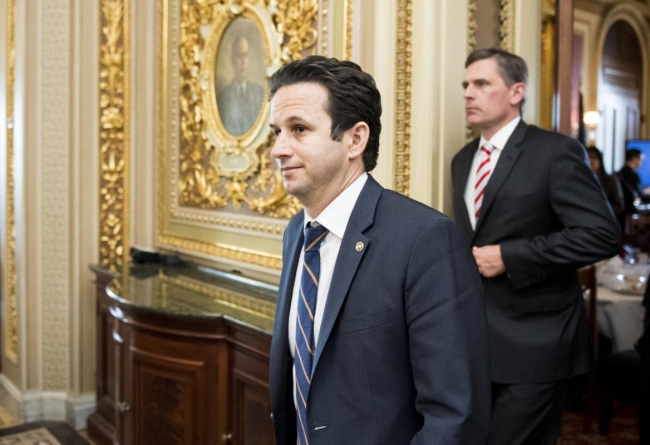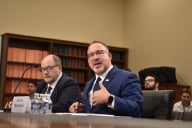You have /5 articles left.
Sign up for a free account or log in.

Senator Brian Schatz, a Hawaii Democrat, has authored a bill to overturn the ban on federal aid for incarcerated students.
Getty Images
Advocates of prison education who want to overturn a quarter-century ban on federal aid for incarcerated students have spent much of the past year slowly building support in Congress.
In the last week, those efforts have gained new momentum from outside Capitol Hill.
Telecom giant Verizon Communications issued an endorsement of bipartisan legislation to reinstate Pell Grants for incarcerated students. And a group of GOP governors said they support federal aid for those students, among other changes to the Pell program, in a letter to key Senate lawmakers.
While the prospects of Congress lifting the ban are still uncertain, the endorsements show the growing interest in prison education among industry and elected officials. Incarcerated students are receiving new attention from beyond their traditional advocates thanks to the broader criminal justice reform movement and to concerns over developing an educated labor force.
Senator Brian Schatz, a Hawaii Democrat, has introduced legislation to overturn the ban, called the REAL Act, which has received support from organizations across the ideological spectrum. In a statement endorsing the legislation, Craig Silliman, executive vice president and chief administrative, legal and public policy officer at Verizon, cited arguments that have made the proposal popular even among conservative groups -- reduced recidivism among degree holders, cost savings for states and greater economic opportunity for students. Silliman also said restoring Pell Grants in prisons matches investments the company has made in support of tech education.
“We should cultivate our intellectual capital wherever we find it and pass the REAL Act,” he wrote.
The Verizon endorsement followed a letter to Tennessee senator Lamar Alexander and Washington senator Patty Murray, the top Republican and Democrat on the Senate education committee, respectively, backing changes to the Pell program, including eligibility for short-term credential programs and college courses in prisons.
Julie Ajinkya, vice president of applied research at the Institute for Higher Education Policy, said she’s hopeful that the new support from outside Washington will influence legislation to overhaul the Higher Education Act. Members of Congress need to hear from their states that restoring Pell access is a priority and that their local economies stand to gain, she said. And support from business groups in particular can hold lawmakers’ attention, Ajinkya said.
“That makes a difference, because it is the employers themselves who are looking for well-qualified workers,” she said. “They want to make sure that when individuals are released, that they can actually offer them jobs to help them succeed.”
The U.S. Chamber of Commerce was among more than 50 organizations that encouraged Alexander and Murray to reinstate Pell Grants in prisons in a July letter. But Verizon is the first major employer to endorse repeal of the ban, and the statement has given advocates hope that more corporations will follow.
How Pell for Incarcerated Students Fits Into Higher Ed Overhaul
The arguments from IHEP and other higher ed groups for lifting the Pell ban go far beyond building a better-educated pool of workers. Access to college education can transform both individuals behind bars and the environment in prisons, advocates say. And postsecondary instruction has positive effects on both the prison environment as well as the children and family members of incarcerated people.
Ajinkya said people incarcerated in U.S. prisons are also representative of student groups traditionally underserved by colleges.
“They are first-generation, low-income, often students of color that higher education as a whole needs to do a better reaching,” she said.
In a sign of the progress advocates have made on lifting the Pell ban in Congress, Alexander introduced legislation last month that included access to the grants for incarcerated students. His bill, however, would leave restrictions on student aid in place for individuals not eligible for parole.
Ajinkya said the Alexander proposal was “a step in the right direction” but added that including any student eligibility restrictions would be disappointing.
“It’s not just a loss to that individual. If we continue to restrict eligibility for incarcerated students, it’s a loss to society,” she said.
Advocates for expanding aid to incarcerated students said the Verizon’s endorsement of the REAL Act, while impressive on its own, is also an opportunity for the company and other corporations to re-examine their own policies. That could include hiring practices involving formerly incarcerated people and their direct support for education, said Syrita Steib, executive director of Operation Restoration, which advocates for women and girls affected by the criminal justice system.
“Are they moving in a direction that is fair and equitable for people who are released from prison as well?” she said. “It’s one step for me in the larger goal of reintegrating people into society.”








